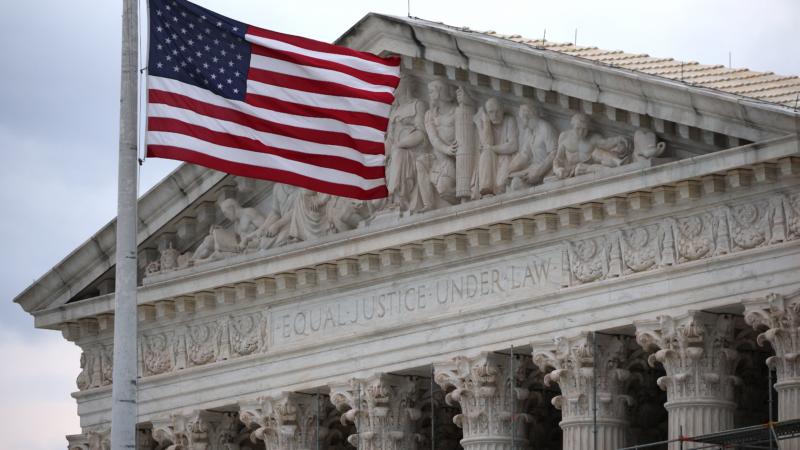Trump asks Supreme Court to allow deportations under Alien Enemies Act
President Trump’s administration asked the U.S. Supreme Court on Friday to lift a lower court’s order and allow it to use the Alien Enemies Act to swiftly remove alleged members of a Venezuelan gang.
Trump invoked the rarely used wartime power earlier this month when it sent more than 200 Venezuelan men to a maximum security prison in El Salvador. But U.S. District Judge James Boasberg temporarily blocked the use of the Alien Enemies Act. And a three-judge panel from the D.C. Circuit Court of Appeals earlier this week in a 2-1 ruling agreed to keep Boasberg’s order in place.
“This case presents fundamental questions about who decides how to conduct sensitive national-security-related operations in this country—the President, through Article II, or the Judiciary,” Acting Solicitor General Sarah Harris wrote in the appeal to the Supreme Court. “The Constitution supplies a clear answer: the President. The republic cannot afford a different choice.”
She added that Boasberg’s orders “have rebuffed the President’s judgments as to how to protect the Nation against foreign terrorist organizations and risk debilitating effects for delicate foreign negotiations.”
The American Civil Liberties Union and Democracy Forward sued the Trump administration over its use of the Alien Enemies Act. They said the administration removed people without due process.
Judge Patricia Millett said seemed to concur during oral arguments at the D.C. Circuit this week. “Nazis got better treatment under the Alien Enemies Act than what has happened here,” she said. “They had hearing boards before they were removed.”
The White House has said the Venezuelans removed to El Salvador belonged to Tren de Aragua, a criminal organization designated by the Trump administration as a foreign terrorist group. But the administration has provided little evidence to back those claims.
In fact, the administration has conceded in court documents that many of the people on these flights to El Salvador didn’t have criminal records in the U.S. But it says that “the lack of specific information about each individual actually highlights the risk they pose.”
New York Giants hire John Harbaugh as coach after identifying him as their top choice
Harbaugh joins the Giants 11 days after he was fired by the Baltimore Ravens. The Super Bowl champion is now tasked with turning around a beleaguered franchise.
US launches new retaliatory strike in Syria, killing leader tied to deadly Islamic State ambush
A third round of retaliatory strikes by the U.S. in Syria has resulted in the death of an Al-Qaeda-affiliated leader, said U.S. Central Command.
NASA rolls out Artemis II craft ahead of crewed lunar orbit
Mission Artemis plans to send Americans to the moon for the first time since the Nixon administration.
Trump says 8 EU countries to be charged 10% tariff for opposing US control of Greenland
In a post on social media, Trump said a 10% tariff will take effect on Feb. 1, and will climb to 25% on June 1 if a deal is not in place for the United States to purchase Greenland.
‘Not for sale’: massive protest in Copenhagen against Trump’s desire to acquire Greenland
Thousands of people rallied in Copenhagen to push back on President Trump's rhetoric that the U.S. should acquire Greenland.
Uganda’s longtime leader declared winner in disputed vote
Museveni claims victory in Uganda's contested election as opposition leader Bobi Wine goes into hiding amid chaos, violence and accusations of fraud.






